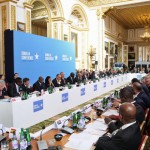Today’s Conference on Somalia in London was historic for two reasons. First, it was the best opportunity in the last few decades for Somali leaders to stand up, on a more or less equal footing, with key international partners and decide the future of their country.
And second, the course set today will have a lasting effect for many years to come as the country stands at a crucial crossroads in terms of future peace and development. And what was decided matters to American national security through the strategy to counter international terrorist threats and reduce the costs of political instability around the world.
At the same time, there is a growing sense of a choice, among Somalis and Somalia watchers around the world, between one path that risks retreading the route of old conflicts and another that will break new ground and nurture a nascent sense of confidence.
It is useful to start by looking back, where Somalia has come from most recently. Almost two years ago, the capital, followed by other urban centers, was wrested from the control of Islamic militants. Since then progress has been made in building discussions to decide how to fairly distribute power in the country, the foundations for any legitimate governmental order. And now there is a growing population of stakeholders, including returning diaspora, who are sick of costly violence and choosing to invest in peace.
 The President of Somalia, now in place for eight months, stood up today, alongside the British Prime Minister, David Cameron, and more than fifty other delegations from around the world – including Deputy Secretary of State Bill Burns – as a partner and decision-maker. He brought to the table a plan for how he intends to put his country back on the road to recovery in the critical areas of justice, security and good governance.
The President of Somalia, now in place for eight months, stood up today, alongside the British Prime Minister, David Cameron, and more than fifty other delegations from around the world – including Deputy Secretary of State Bill Burns – as a partner and decision-maker. He brought to the table a plan for how he intends to put his country back on the road to recovery in the critical areas of justice, security and good governance.
When it comes to security the framework has already been established and foremost amongst the outcomes was funding support of some $70 million – the majority from the European Union – to aid the constitution, training and equipping of stronger Somali security forces. Historically, fighting forces in Somalia have been a motley collection of militia, beholden to particular clans and warlords, and have been an enemy of national unity. In this difficult context, the President asked for funding and hands-on training to construct the spearhead for his fight against the remaining militant forces.
A lot of work is still to be done to secure Somalia. Once an Islamic militant movement turns into a chronic insurgency, which al Shabaab risks becoming, it holds a potentially tenacious yet elusive grip on society, and makes for a difficult enemy to eradicate through conventional military force, a recognizable context from the US experiences in Afghanistan and Iraq.
So, when the twin pillars of good governance and justice were dealt with on the Conference agenda heads would have turned to the Somali President and his Ministers with a high sense of expectation as these provide the key drivers of support the government must successfully manipulate to maintain their new post-Shabaab order. Previous internationally-led attempts to stand up a centralized government have failed, often due to a palpable lack of legitimacy and predatory corruption.
This government, based in the capital and the almost exclusive focus of the Conference, will be challenged over the coming years to prove to the many nomadic and impoverished people of Somalia that it can be of real benefit in their daily lives. While it may be a fringe and rarely popular element in Somali society, many still have to deal with the reality of the Islamicist network of al Shabaab fighters who come from different clans and have adapted to maintain sway in areas away from government and African Union forces.
Many of those areas free from the Islamicist influence are standing up and claiming some degree of autonomy, though not separation, from the writ of central government. Whether this is a real push by the Somali people for the creation of constitutional federalism, or simply a call for the devolved power, has yet to be seen. And while these hot topics were not specifically part of today’s discussions, they are looking increasingly pressing in other venues. What is clear is that donors will have to ruthlessly keep an eye on the achievable and find a realistic way to commit to Somali stabilization for decades, and not just a few years, even with the Conference promise of elections to be held just round the corner in 2016.
Too often, recent attempts at state building have been susceptible to the bright spotlight of an international ideal and external pressures, and not sufficiently rooted in the actual challenges a fragile nation and its population faces. In Somalia, a country rent apart by persistent conflict and recurring famine that has left a population on its knees, Somali leaders and their international supporters will need to continue to tread lightly as they steer a course that is in the interests of Somalis now and for the future.
Also check out the former Prime Minster discussing the key issues in the U.S. -Somalia relationship; the progress already made in his country; as well as the political, economic and military challenges still ahead – here.


